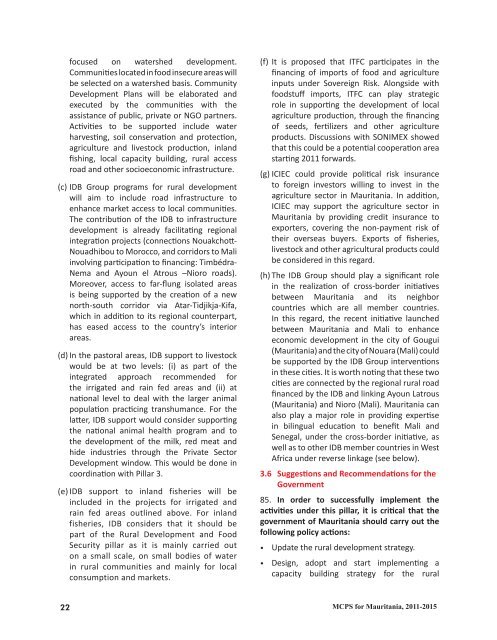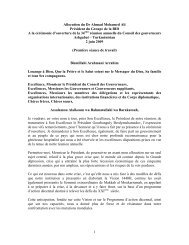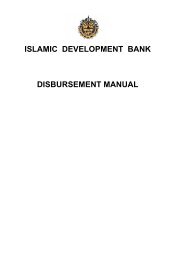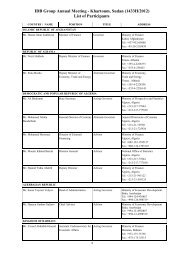Mauritania - Islamic Development Bank
Mauritania - Islamic Development Bank
Mauritania - Islamic Development Bank
Create successful ePaper yourself
Turn your PDF publications into a flip-book with our unique Google optimized e-Paper software.
22<br />
focused on watershed development.<br />
Communities located in food insecure areas will<br />
be selected on a watershed basis. Community<br />
<strong>Development</strong> Plans will be elaborated and<br />
executed by the communities with the<br />
assistance of public, private or NGO partners.<br />
Activities to be supported include water<br />
harvesting, soil conservation and protection,<br />
agriculture and livestock production, inland<br />
fishing, local capacity building, rural access<br />
road and other socioeconomic infrastructure.<br />
(c) IDB Group programs for rural development<br />
will aim to include road infrastructure to<br />
enhance market access to local communities.<br />
The contribution of the IDB to infrastructure<br />
development is already facilitating regional<br />
integration projects (connections Nouakchott-<br />
Nouadhibou to Morocco, and corridors to Mali<br />
involving participation to financing: Timbédra-<br />
Nema and Ayoun el Atrous –Nioro roads).<br />
Moreover, access to far-flung isolated areas<br />
is being supported by the creation of a new<br />
north-south corridor via Atar-Tidjikja-Kifa,<br />
which in addition to its regional counterpart,<br />
has eased access to the country’s interior<br />
areas.<br />
(d) In the pastoral areas, IDB support to livestock<br />
would be at two levels: (i) as part of the<br />
integrated approach recommended for<br />
the irrigated and rain fed areas and (ii) at<br />
national level to deal with the larger animal<br />
population practicing transhumance. For the<br />
latter, IDB support would consider supporting<br />
the national animal health program and to<br />
the development of the milk, red meat and<br />
hide industries through the Private Sector<br />
<strong>Development</strong> window. This would be done in<br />
coordination with Pillar 3.<br />
(e) IDB support to inland fisheries will be<br />
included in the projects for irrigated and<br />
rain fed areas outlined above. For inland<br />
fisheries, IDB considers that it should be<br />
part of the Rural <strong>Development</strong> and Food<br />
Security pillar as it is mainly carried out<br />
on a small scale, on small bodies of water<br />
in rural communities and mainly for local<br />
consumption and markets.<br />
(f) It is proposed that ITFC participates in the<br />
financing of imports of food and agriculture<br />
inputs under Sovereign Risk. Alongside with<br />
foodstuff imports, ITFC can play strategic<br />
role in supporting the development of local<br />
agriculture production, through the financing<br />
of seeds, fertilizers and other agriculture<br />
products. Discussions with SONIMEX showed<br />
that this could be a potential cooperation area<br />
starting 2011 forwards.<br />
(g) ICIEC could provide political risk insurance<br />
to foreign investors willing to invest in the<br />
agriculture sector in <strong>Mauritania</strong>. In addition,<br />
ICIEC may support the agriculture sector in<br />
<strong>Mauritania</strong> by providing credit insurance to<br />
exporters, covering the non-payment risk of<br />
their overseas buyers. Exports of fisheries,<br />
livestock and other agricultural products could<br />
be considered in this regard.<br />
(h) The IDB Group should play a significant role<br />
in the realization of cross-border initiatives<br />
between <strong>Mauritania</strong> and its neighbor<br />
countries which are all member countries.<br />
In this regard, the recent initiative launched<br />
between <strong>Mauritania</strong> and Mali to enhance<br />
economic development in the city of Gougui<br />
(<strong>Mauritania</strong>) and the city of Nouara (Mali) could<br />
be supported by the IDB Group interventions<br />
in these cities. It is worth noting that these two<br />
cities are connected by the regional rural road<br />
financed by the IDB and linking Ayoun Latrous<br />
(<strong>Mauritania</strong>) and Nioro (Mali). <strong>Mauritania</strong> can<br />
also play a major role in providing expertise<br />
in bilingual education to benefit Mali and<br />
Senegal, under the cross-border initiative, as<br />
well as to other IDB member countries in West<br />
Africa under reverse linkage (see below).<br />
3.6 Suggestions and Recommendations for the<br />
Government<br />
85. In order to successfully implement the<br />
activities under this pillar, it is critical that the<br />
government of <strong>Mauritania</strong> should carry out the<br />
following policy actions:<br />
• Update the rural development strategy.<br />
• Design, adopt and start implementing a<br />
capacity building strategy for the rural<br />
MCPS for <strong>Mauritania</strong>, 2011-2015






